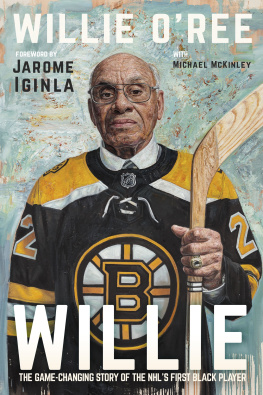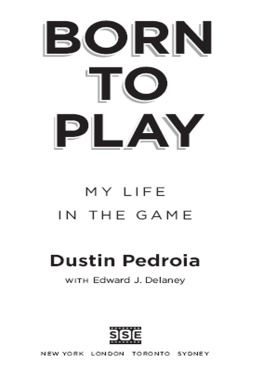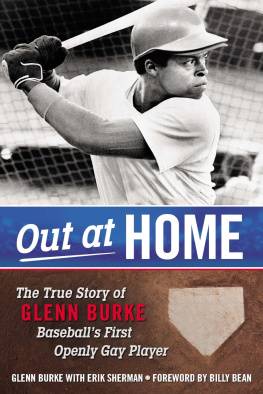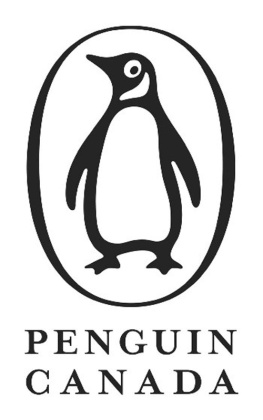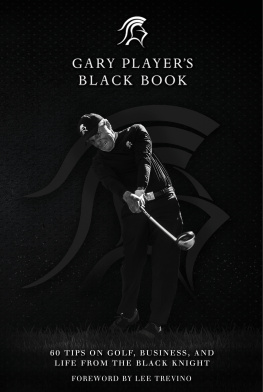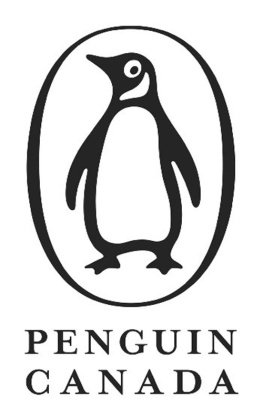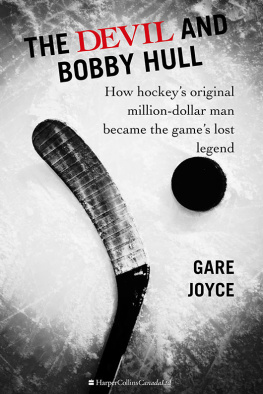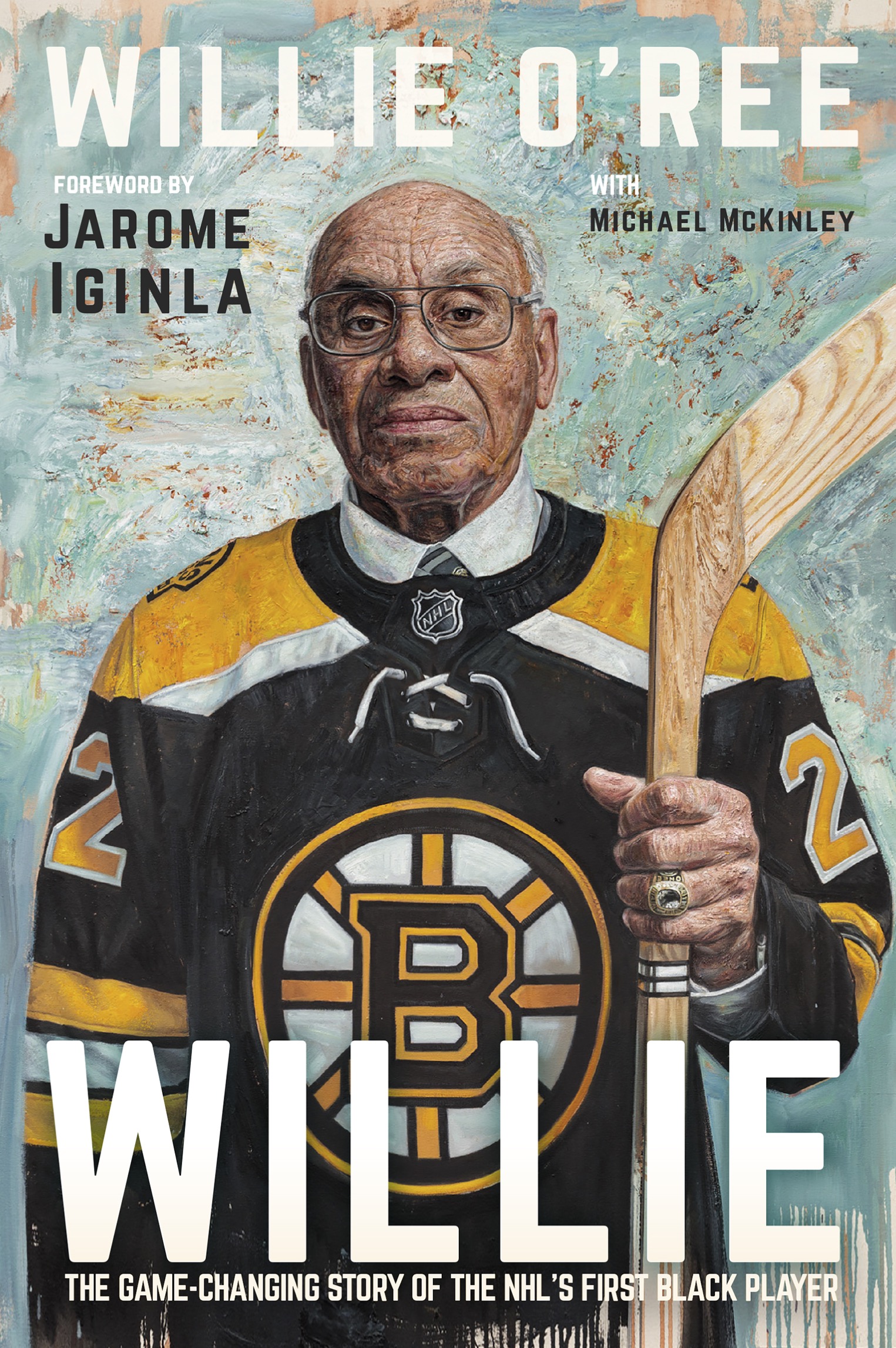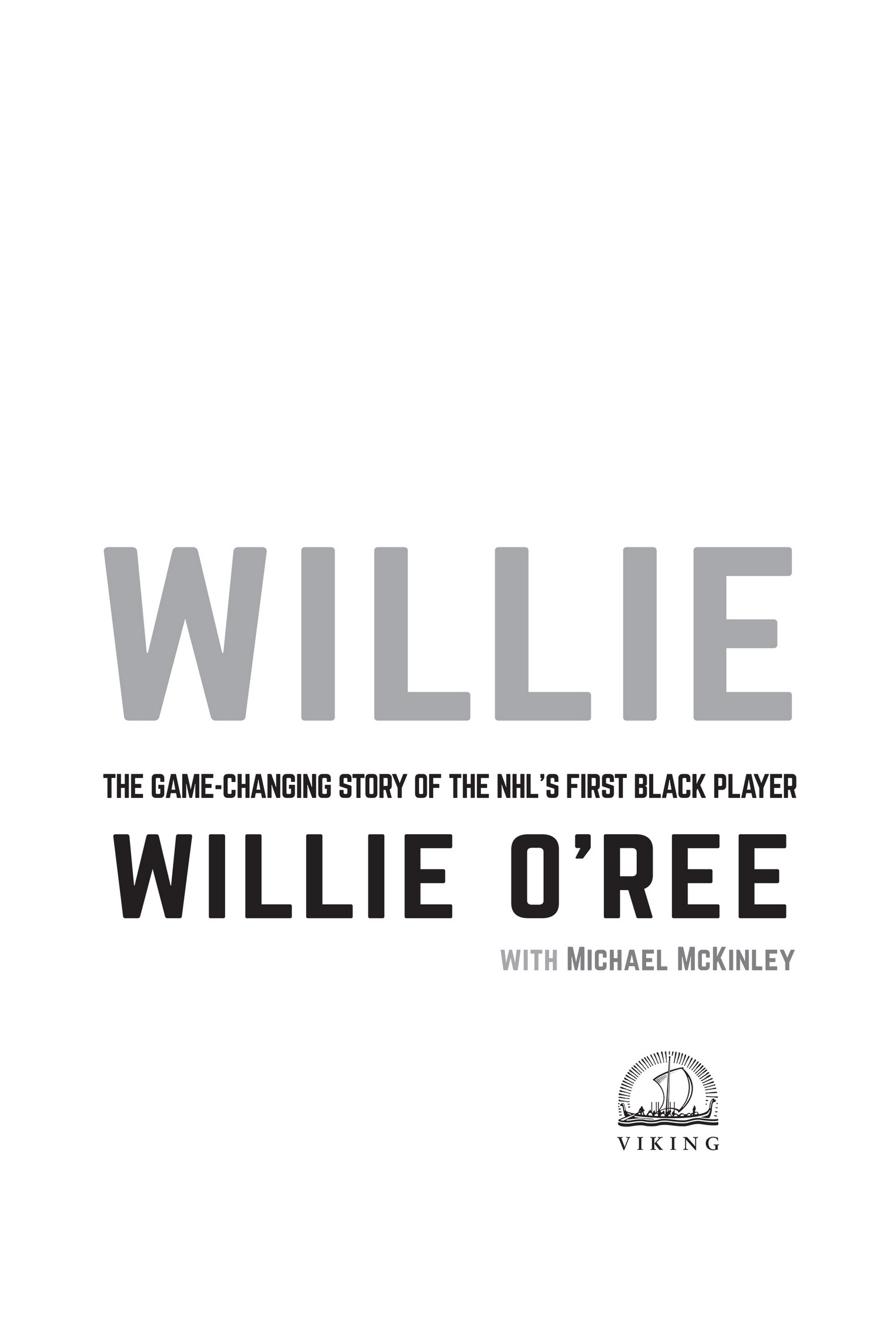Contents
Landmarks
Print Page List
VIKING
an imprint of Penguin Canada, a division of Penguin Random House Canada Limited
Canada USA UK Ireland Australia New Zealand India South Africa China
First published 2020
Copyright 2020 by Willie ORee | Foreword 2020 by Jarome Iginla
All rights reserved. Without limiting the rights under copyright reserved above, no part of this publication may be reproduced, stored in or introduced into a retrieval system, or transmitted in any form or by any means (electronic, mechanical, photocopying, recording or otherwise), without the prior written permission of both the copyright owner and the above publisher of this book.
www.penguinrandomhouse.ca
LIBRARY AND ARCHIVES CANADA CATALOGUING IN PUBLICATION
Title: Willie : the game-changing story of the NHLs first black player / Willie ORee with Michael McKinley
Names: ORee, Willie, 1935- author. | McKinley, Michael, 1961- author.
Identifiers: Canadiana (print) 20200179535 | Canadiana (ebook) 20200179543 | ISBN 9780735239746 (hardcover) | ISBN 9780735239753 (HTML)
Subjects: LCSH: ORee, Willie, 1935- | LCSH: Hockey playersCanadaBiography. | CSH: Black Canadian hockey playersBiography | LCGFT: Autobiographies.
Classification: LCC GV848.5.O69 A3 2020 | DDC 796.962092dc23
All photos are from Willie ORees personal collection unless otherwise specified.
Book design by Andrew Roberts
Cover design: Andrew Roberts
Cover image: Portrait of Willie ORee by Tim Okamura, originally commissioned for the acclaimed documentary Willie, produced and directed by Laurence Mathieu-Leger, Bryant McBride, and Ebyan Bihi. Williedoc.com
a_prh_5.6.0_c0_r1
CONTENTS
To everyone who had a dream
and was told no, you cant,
but found a way to find the yes, I can.
FOREWORD
In many ways, I grew up like Willie ORee: in a small Canadian town, playing every sport available, especially baseball and hockey.
Also, I was often the only minority kid on the team.
Not that it usually made much difference. My friends never made me conscious of this fact. My teammates didnt seem to notice. Why should I care?
Well, for one thing, the world isnt made up just of friends and teammates. It would be a lot easier if it were.
I clearly remember the first time someone pointed out to me that my color was different from the other kids playing hockey. I was at a tournament just outside of Edmonton, the first tournament Id ever been to. I was playing Novice C (or Shaver C, as it was called back then). I could barely skate.
I had just played, and I was standing in line at the concession booth, waiting to get some fries. There were a couple of kids from another team ahead of me. For some reason, one of them turned around. Our eyes met briefly, then he did a double-take. Then he asked a question Willie ORee must have been asked a lot more often than I was.
Why are you playing hockey? Black people dont play hockey.
Who knows what was going through that kids mind at the time. I remember his face clearly to this day, and I remember just as unmistakably the expression on it, and the tone of his voice, both of which told me that his intentions were not friendly, or curious. He was suggesting that I didnt belong in hockey.
One of the reasons I remember that tournament so vividly is that I didnt have an answer for that kid. I was stung. Of course I was. I was just seven years old. That kind of unfriendliness just doesnt make sense to a seven-year-old. So I wasnt just hurt; I was confused.
Naturally, I told my mom. She said not to worry about what other kids say. She said black people are amazing athletes and amazing people. She said I could play or be whatever I wanted. And she had proof. She just told me to look at Grant Fuhr. My mother wasnt a big hockey buff, but there was no one in Alberta who didnt know who Grant Fuhr was. She was right, of course. Black people do play hockey. I also remember my dad telling me not to see color but to see people as individuals that I am no better or less than anyone else because of my skin color. I was very fortunate as well that I had my grandparents, who were very helpful with words of encouragement. My grandmother in particular always knew just what I needed to hear.
After those conversations, I knew what to say the next time someone told me I didnt belong.
That is to say, I came to understand something Willie talks about in his book. Racism never stopped me from being a hockey player. Not even close. Sure, there have been ignorant or rude people over the years. But you know what? Those people who tried to pass on their own issues to others almost always brought out the best in the people around me.
When I was playing minor hockey, a parent from the other team might shout something meant to discourage me. It happened. Not often, but it happened. And invariably, a parent from our team would go over and have a word. That means the world to a kid. My mom and my grandpa came to most of my games, but it wouldnt have been the same if they had felt they had to stand up for me, so it was comforting that there were other parents who stepped up, and helped to make me more confident that I belonged in the game, and that it was the person in the stands who didnt belong.
And sure, I heard that kind of language on the ice from time to time, but my teammates have always had my back. Willie says the same thing happened when he played. Hockey is like that. On any good team, the things that make you different dont matter. Its the things you have in common that pull you together. When youre wearing the same sweater, nothing else should matter.
So no, racism never stopped me from being a hockey player. But it did stop me from being just a hockey player. Whether I wanted it or not, I was always a black hockey player.
Not that I minded being a black hockey player. But it was a reminder of how difficult the road ahead could have been for me. If youre a white kid, you probably never have to think about these things, because every one of your heroes looks like you. Everyone in the Hockey Hall of Fame looks like you. The guy hoisting the Stanley Cup looks like you. Every number one draft pick looks like you. In fact, everyone in the whole draft. You get the picture.
Thats no ones fault. But it does make it hard to dream about the NHL as a career when youre black. Harder, anyway. But I definitely had those dreams. So naturally, I was always aware of the careers of black players in the NHL. It is impossible to exaggerate what Claude Vilgrain meant to me as a kid. Or Tony McKegney. Youre never going to accomplish something you dont dream of, and I know that seeing stars like Fuhr made my dream feasible.
Dont get me wrong. I had a lot of the same idols as the other kids. I loved Gretzky and wanted to be like Messier, but it was people like Fuhr, Vilgrain, and McKegney who kept my dream alive. They gave me an answer for whenever the same awkward question came up.
I wish I had known about Willie ORee back then. Maybe McKegney and Vilgrain knew about him, but I didnt. I wasnt much of a history buffI was just a kid in love with sports, hockey, and the Oilers, in that order. Later on, I learned about his legacy, of course. It would have been impossible not to. But I didnt meet Willie until my rookie year in the NHL.

